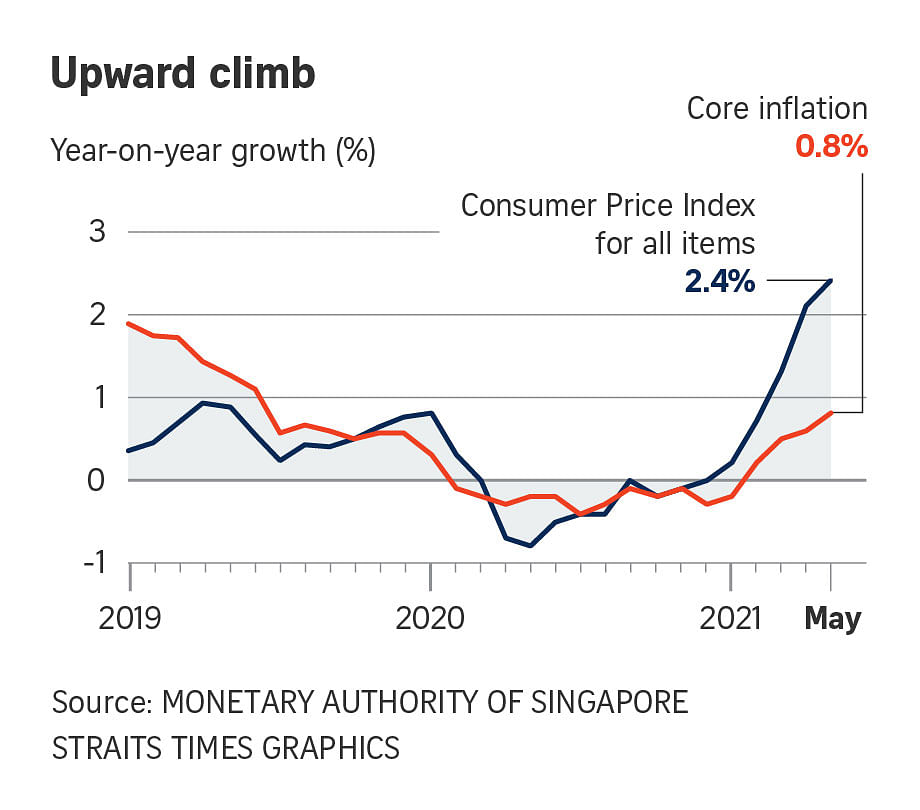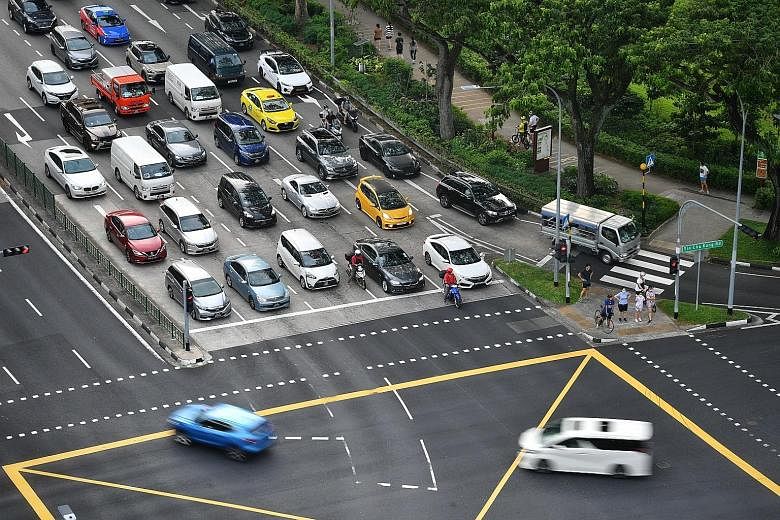Core inflation in Singapore continued its upward climb last month, driven by higher services inflation and a smaller decline in the cost of retail and other goods.
Core inflation, which excludes accommodation and private road transport costs, rose to 0.8 per cent on a year-on-year basis last month, up from the 0.6 per cent recorded in April.
This is the fourth straight month that core inflation has risen, after spending a year in negative territory.
Meanwhile, overall inflation rose to 2.4 per cent, up from 2.1 per cent in April. The was on account of higher private transport and accommodation costs, said the Monetary Authority of Singapore (MAS) and the Ministry of Trade and Industry (MTI), which released the data yesterday.
The inflation figures exceeded the expectations of economists polled by Bloomberg, who predicted core inflation to rise to 0.7 per cent and overall inflation to come in at 2.2 per cent.
The increase in both inflation indicators was partly due to the low base in May last year when circuit breaker measures were in place, MAS and MTI said.
UOB economist Barnabas Gan noted that Singapore saw persistent deflation between April and November last year on the back of a relatively weaker economic environment and low oil prices then.
"Therefore, the rise of consumer prices may continue to be observed in the months ahead, although it is expected to be transitory when the base effects eventually dissipate."
MAS and MTI said external inflation has risen amid the recovery in global oil prices and turnaround in producer price inflation in the major economies.
But the upward pressure on global inflation should ease in the latter part of this year, they said.
"Surplus oil production capacity should cap the extent of oil price increases, while continued negative output gaps in some of Singapore's major trading partners should moderate import price pressures."
Core inflation will continue to rise gradually, although the latest Covid-19 curbs in Singapore "could have an overall dampening effect on the pickup in underlying inflation", added MAS and MTI.
"In addition, uncertainty in the economic outlook will weigh on consumer sentiment and hence price increases in the near term."
Meanwhile, private transport and accommodation costs should remain resilient on the back of firm demand for cars and rental accommodation.
Drilling down into the inflation data, private transport costs rose more sharply, surging 14.5 per cent last month, compared with the 12.9 per cent in April. This was largely due to a steeper increase in petrol prices, partly reflecting the low base in May last year. Car prices also picked up at a faster pace.
Services inflation picked up to 1.4 per cent, on the back of an increase in telecommunication services fees as well as higher point-to-point transport and health insurance inflation.
Accommodation inflation also edged up to 0.9 per cent as housing rents rose at a faster pace.
Maybank Kim Eng economists Chua Hak Bin and Lee Ju Ye said: "We think rentals are partly driven by the return of overseas Singaporeans and permanent residents because of the pandemic. We think more than 50,000 Singaporeans may have returned home since January last year."
The cost of retail and other goods fell more gradually, at a decline of 0.8 per cent last month, compared with the drop of 1.1 per cent in April.
This was due to the price of household durables registering a larger increase, while that of clothing and footwear fell by a smaller extent, MAS and MTI said.
Food inflation remained unchanged at 1 per cent.
Electricity and gas prices fell at a slower pace, at a decline of 1.9 per cent, largely on account of the Open Electricity Market having a smaller dampening effect on electricity prices. There was a slowdown in new take-up rates, as well as a stronger pickup in gas prices, MAS and MTI said.
Official forecasts for the year are unchanged. Core inflation for this year is expected to average 0 per cent to 1 per cent, while overall inflation is forecast to come in between 0.5 per cent and 1.5 per cent.



